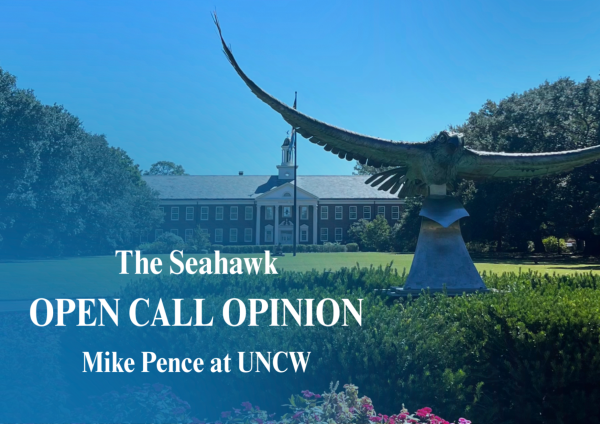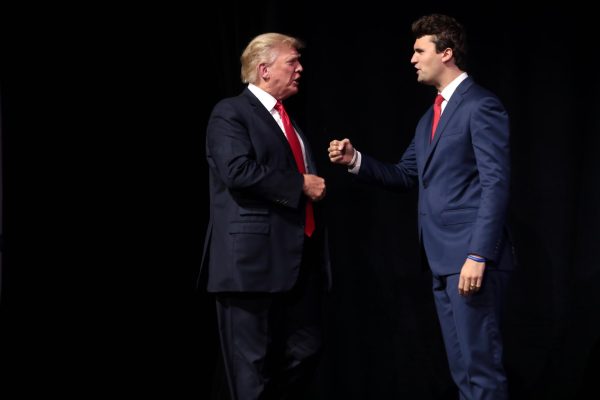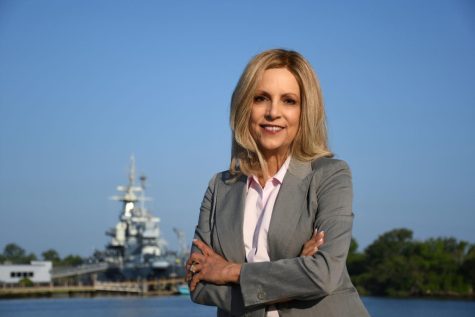Trump’s State of the Union address: A call for unity
Editor’s Note: Kristen Rodriguez is a freshman at UNCW majoring in Political Science with a minor in International Relations. Kristen is a staff writer for The Seahawk and writes many of the pieces featured in Political Perspectives. All opinions expressed in this article are solely those of the author. Kristen may be found on Twitter @kristen_rodd. All suggestions and inquiries may be sent via email to [email protected].
Last week, President Trump gave his much awaited State of the Union address. It has been the talk of Washington because in previous speeches, Trump has included negative statements and divisive one-liners. It is easy to say that people expected this address to be nothing different; but in many ways people were shocked by how it turned out.
The address seemed to be a complete 180 from his usual finger-pointing daily remarks about the things happening in his administration. There were unifying statements, talk of “[setting] politics aside,” “A new tide of optimism,” and even a “call upon all of us to set aside our differences, to seek common ground and to summon the unity we need”. All of which are not very common for our President to say. The question now, is how much of what he said were things he genuinely intends to do and believes, and how much of it is just talk.
Trump’s address went through many stages, with plenty of applause breaks, he began by highlighting major events that have happened during the past year. This included the hurricanes, the shootings and so on. He recognized and told the stories of many who have committed heroic acts or acts of kindness.
He listed (and took credit for) successes in the economy that have continued during his presidency (most of which, began during the ends of Obama’s years). As well as his plans to improve our infrastructure (despite proposing to cut $499 million from the Transportation Department during his budget proposal last year.)
He went through his thoughts on immigration and the effect it has on our nation. He spoke of our military and how we need to do more for it along with mentioning the tax cuts and their benefits. Trump touched on drug problems in the United States and plans to lower the cost of medicine. He said his piece on foreign policy with a lengthy anecdote on North Korea and announced his plan to rebuild our nuclear arsenal.
Between all these topics were comments with seemingly hidden meanings, comments that are more of what we would expect from Trump. However, for the majority of the address, it was not what was said that was particularly concerning, but rather the way in which the topics were presented and the context that was used to discuss them. Some of his remarks also play into some recent actions and what he says does not always match up with the things he does.
The first example of this is when he said, “In America, we know that faith and family, not government and bureaucracy, are the center of the American life. Our motto is ‘in God we trust.'” Throughout his presidency, Trump has made his best effort to keep support from the “average American Christian,” which has been reflected in his fight for religious liberty, campaign against abortion, and most recently, his moves to repeal parts of the Johnson Amendment, which prohibit churches and other non-profits from giving financial support to political campaigns.
The separation of church and state has been an ideal the United States has had since Thomas Jefferson. This movement has the potential to give religious organizations more influence in elections, and more ability to push their own agendas, whatever they may be.
President Trump is a grand supporter of our troops and military. Trump asked Congress to “fully fund our great military” and said that as part of our defense we must “modernize and rebuild our nuclear arsenal.” Claiming that if we make it strong enough “it will deter any act of aggression.”
Unfortunately, history has shown that is not how this will play out. When one nation decides to build up their nuclear forces, it will only make other nations feel threatened, causing them to build up their forces and so on. Other countries will not be pleased with a fully loaded nuclear arsenal existing somewhere and it will only raise tensions even more. History is almost bound to repeat itself here, and it is likely that this will play out the way the Arms Race during the Cold War did, with potentially disastrous results.
Immigration policy has been a driving force for Donald Trump since the beginning of his presidential campaign. The problem here is Trump spent the majority of his time on immigration discussing how “open borders have allowed drugs and gangs to pour into our most vulnerable communities.” He told a story about two teenage girls that were killed by MS-13 members, about how “a single immigrant can bring in virtually unlimited numbers of distant relatives.”
What Trump did here, as he has done since the beginning, is associate immigration with only negative issues in our country. Do drugs and gangs cross the border into the United States? Yes. Is it the only thing that comes from immigration? No. Immigration is the core of our nation’s founding and yet since then, anytime there has been immigration to the United States, those immigrants have been blamed for the bad things that happen in the country.
His immigration reform proposal is one of the most interesting points of his speech and his administration. Republicans in Congress have been supporting themselves well so far; they have passed legislation they have wanted without much regard for the opinions of the House and Senate minority. However, on immigration Trump claimed “my administration has met extensively with both Democrats and Republicans to craft a bipartisan approach to immigration reform.” He even called it “a fair compromise – one where nobody gets everything they want.”
The “four pillars” of his proposal are as follows: the first accommodates DACA, (without mentioning it by name), the second builds his wall and adds to border security details, the third ends the visa lottery and the fourth ends chain migration. The reality is, that this will not do much to limit unauthorized immigration, mainly due to the fact that the majority of unauthorized immigrants in the United States are people who entered lawfully, but overstayed their visas.
President Trump claimed that chain migration means “a single immigrant can bring in virtually unlimited numbers of distant relatives,” which, as it happens is not true. Current law only allows for an immigrant to sponsor close family members, parents, siblings, spouses and children. Under Trump’s proposal, only spouses and minor children may be sponsored, leaving out adult children and all other family members.
The real problem with the address, is the way in which he presented all his information. The things which he supports and wanted to promote, he used language that makes it seem wonderful and he told half-lies that would be believable if you only had vague knowledge on the subject. Calling the current immigration system, a “broken system” when it is not as broken as he makes it seem.
Saying that the United States does “more than any other country to help the needy, the struggling and the underprivileged all over the world,” while that may have truth to it, President Trump has made many moves to reverse programs and remove the United States from things that would benefit large populations of people, repealing DACA, the Travel Ban etc.
The President of the United States has a lot of power on an international level, one of the best things a President can do is keep their government accountable for their actions. Trump did that at points during his speech, by making all the claims he made about wanting a unified government, putting “politics aside”, standing together despite party and compromise. All of these are important things for a President to say, because they give the people a certain expectation of how the government should act.
So, for Trump to stand in front of all members of Congress and people all over the world and express his desire for the parties to come together to compromise and run the government “for the people” is an important move. Trump made very important claims during his address, which may be a small step in the right direction towards getting the people on board with him, but it will take a lot more than just words to make that happen. What Trump needs to do is prove that he is more than his words, and put what he says into action, but if he can really work towards a political environment with compromise and unity, it might not be impossible.








